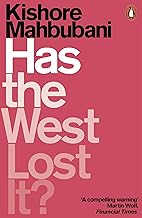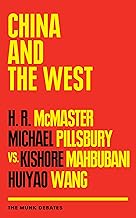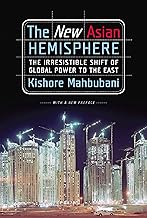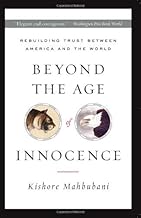Kishore Mahbubani sempre foi um bom analista das relações internacionais, em especial da China e da Ásia Pacífico. Desta vez ele falhou enormemente, e demonstrou grande ingenuidade, ao confundir BRICS com Global South. Está fazendo o jogo da China, talvez involuntariamente. PRA
POLITICS, TOP 5, WORLD AFFAIRSThe Global South: A new North Star
Pearls and Irritations (Australia), Oct 19, 2023
https://johnmenadue.com/the-global-south-a-new-north-star/
We live in surprising times.
Many short-term shocks continue to surprise us: the Covid-19 pandemic, the Ukraine war and the latest Hamas attack. Yet, what makes our world truly hard to understand and grasp in totality is that we are also experiencing simultaneously many long-term structural shifts: the rise of China and India, the broader return of Asia, the relative decline of the West and, equally importantly, the resurgence of the Global South. It is these long-term structural shifts, not the short-term shocks, which will shape our future.
The resurgence of the Global South is going to lead to profound changes in the chemistry of our world order.
Here, a word of caution needs to be added. The Global South has experienced a false dawn before. In the 1950s and 1960s, led by strong and charismatic leaders like Jawaharlal Nehru, Zhou Enlai, Gamal Abdel Nasser as well as Julius Nyerere, Sukarno and Josip Broz Tito, the Global South (then called the Third World) seemed headed to conquer the world. But it did not. Bad economic policies crippled their economic growth.
Hence, at the end of the Cold War, the triumphant Global North (including North America, Western Europe and Japan) commanded over 70 per cent of the global economy. Barely 30 years ago, there seemed to be little hope for the Global South. Political scientist Francis Fukuyama’s essay, The End Of History, predicted a great future for the triumphant West, not for the rest.
Yet, in an essay titled The West And The Rest (published in The National Interest in 1992), I hinted that we should prepare for a new world marked by the resurgence of the Rest. In that essay, I wrote: “Today, Japan’s economic success is having a… psychological impact on developing societies all over the world, gradually convincing them that they too can make it into the developed universe.
“This psychological leap is crucial. Until recently, most Third World nations believed subconsciously that developed status was out of their reach. Today, after looking at Japan and its neighbours, many believe otherwise.” And this is what has come to pass.
Structural shifts
The relative economic weight of the West and the Rest has changed significantly. A quick comparison with the Group of Seven (G-7), the premier club of the Global North, brings this out. In 2000, a decade after the end of the Cold War, the G-7 countries commanded a share of the global economy which was more than twice that of the Brics countries (Brazil, Russia, India, China and South Africa), in purchasing power parity terms. Yet by 2022, the G-7 share had become smaller than that of Brics.
This broader shift of economic power between the North and South is also reflected in other subsets of the North and South. In 2000, Japan towered over the world as its second-largest economy. Its gross domestic product (GDP) in nominal market terms was US$5 trillion, more than eight times bigger than the combined GDP of Asean at US$650 billion.
Yet, by 2022, the GDP of Japan at US$4.2 trillion (S$5.8 trillion) was only 1.2 times bigger than that of Asean’s at US$3.6 trillion. And, by 2030, Asean’s combined economy will be bigger than Japan’s. This relative shift in economic power between Japan and Asean reflects the larger trend of a similar shift between North and South.
As these structural shifts between the North and South accelerate, it would be wise for the countries of the North to make strategic adjustments and give greater voice and recognition to the needs of the South.
Sadly, there is no such wisdom in the North, even though the North does make rhetorical statements acknowledging this. This is shown most clearly in the continued Northern domination, if not dictatorship, of the world’s two most important global economic institutions, namely the International Monetary Fund (IMF) and the World Bank.
Indeed, the statement at the Group of 20 (G-20) summit in London in April 2009 explicitly promised that future leaders of the IMF and World Bank would be selected on the basis of merit, not geographical regions. “We agree that the heads and senior leadership of the international financial institutions should be appointed through an open, transparent, and merit-based selection process,” it said.
Fourteen years have passed. This promise to give the Global South a voice in running these organisations has not been kept. Similarly, the promise to give the Global South a greater voting share in these two organisations has not been kept either, even though in theory a country’s voting share in the IMF is supposed to represent its share of global GDP. The discrepancy is largest for China. Its share of global GDP has risen to 18 per cent, but its voting share of the IMF remains at 6 per cent.
This is partly a result of clever procedural moves by European diplomats to block change in the IMF and World Bank. Yet, it is also the result of the failure of the Global South to speak with one voice. The new and emerging rivalry between China and India is also complicating the picture. Yet, this rivalry could also help to enhance the voice of the South.
India demonstrated this well by ably securing a membership seat for the African Union at the G-20 summit in New Delhi in September 2023. The title of the G-20 should be changed to “G-21” to reflect this change. And this precedent of having a continent represented by a regional organisation should be studied by the European Union, which claims to have a common foreign and security policy.
The sad truth is that the EU, which makes up around 5 per cent of the world’s population, is over-represented in most global organisations, commanding 20 per cent of G-20 seats and 40 per cent of the five permanent seats in the United Nations Security Council.
French President Emmanuel Macron was absolutely right when he said at the Munich Security Conference in February 2023: “I am struck by how we have lost the trust of the Global South.”
Different view
Yet, this lack of voice in key institutions of global governance does not mean the Global South does not get its viewpoint across. Both in their acts of mission and commission, they are signalling that they have a different view of our current global order.
On Ukraine, for example, there is no doubt that a majority of the Global South countries disapprove of the Russian invasion of Ukraine. This is not surprising. This invasion violates international law. Yet, it is surprising that 85 per cent of the world’s population has not imposed sanctions on Russia. Indeed, Russia’s trade with the Global South has grown significantly post-Ukraine invasion. For example, Russia’s trade with India has grown by a whopping 205 per cent in 2022, primarily due to the surge of discounted Russian oil exports to India.
Similarly, the United States has mounted a strong global campaign to persuade countries not to join the Belt and Road Initiative (BRI). This campaign has been partially successful. Many European and Asian countries like Germany, Japan, India and South Korea have not joined the BRI. Yet, out of 193 member states of the UN, over 150 have signed on to join the BRI. There could be no louder signal that the Global South will pursue its own course, even against the opposition of the North.
BRI is bringing real benefits to the Global South. It is striking that the fast train between Jakarta and Bandung (with speeds of up to 350kmh) was launched in the very week that Britain (a member of the G-7) announced it did not have funds to proceed with the fast train between Birmingham and Manchester. Future historians will mark this as a clear indicator of how times have changed in our world.
Singapore is truly fortunate our leaders have decided that, even with our economic success, we would remain a member of key organisations of the Global South, like the Non-Aligned Movement and the Group of 77. We could have easily joined one of the bastions of the North, the Organisation for Economic Cooperation and Development.
Yet, by sticking with the Global South, we made the right decision. And we will now enjoy the many benefits of working closely with both the North and South.






